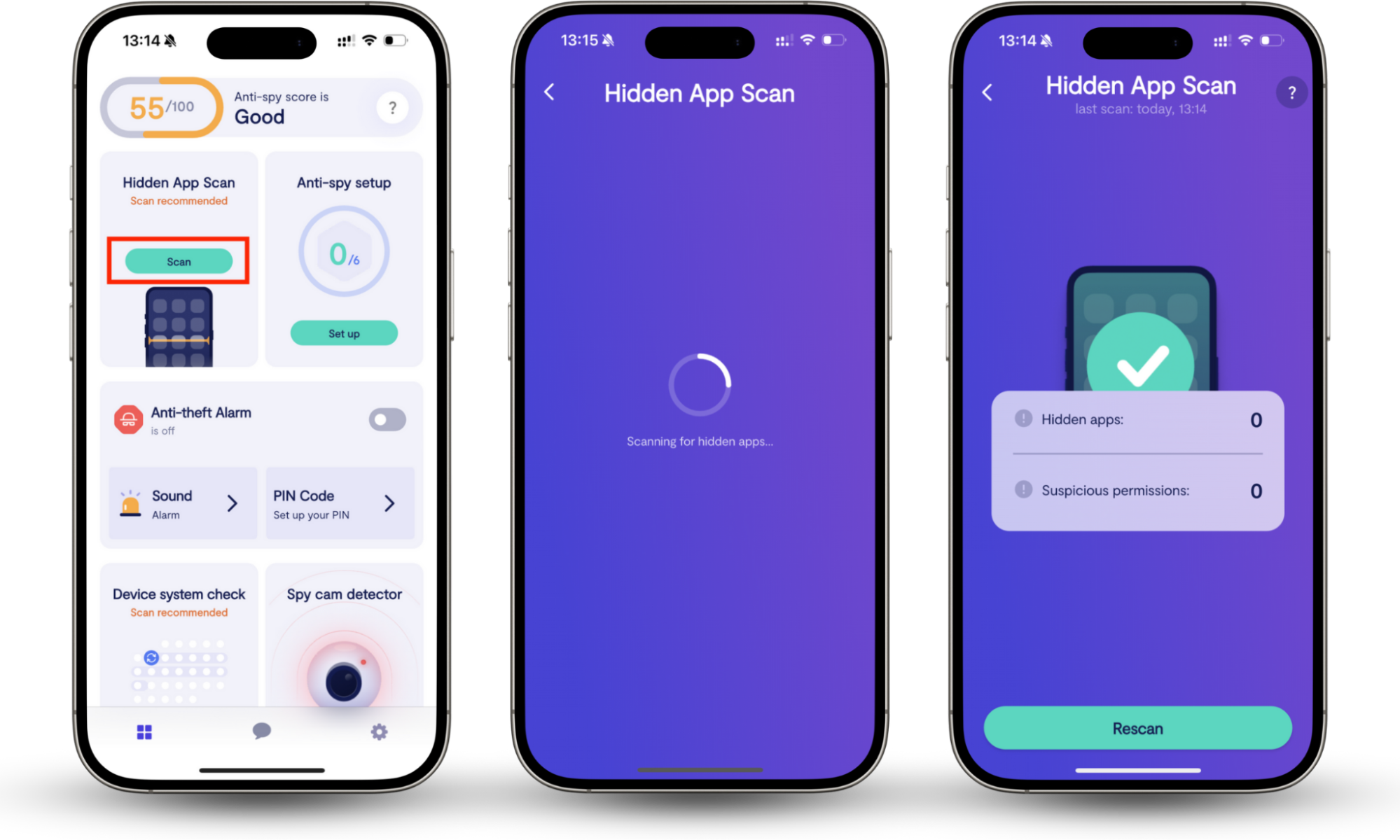Table of contents
- What is doxxing?
- Who can get doxxed?
- How harmful can doxxing be?
- How does doxxing work?
- Data broker reverse-searches
- Wi-Fi sniffing
- Examining file metadata
- IP logging
- What is swatting?
- Is doxxing illegal?
- What to do if you’ve been doxxed
- How to protect yourself against doxxing
- Limit and protect internet communications
- Use varying passwords
- Avoid logging in with Facebook and Google on pop-ups
- Avoid data broker sites
- Protect your information with Clario Anti Spy
- Conclusion
What is doxxing?
One peculiarity of the internet is that we need to reveal certain pieces of personal information about ourselves before using most of its features. But many users still wonder, what is doxxing exactly?
Doxxing is an online threat to user privacy. It's when someone searches for, collects, and publicly exposes personal information without the individual's consent.
In 2025, doxxing has evolved beyond simple harassment into complex social engineering. This is why it’s important to protect yourself proactively.
The impact of doxxing can go from subtle consequences to life-changing ones. Some people’s lives have been ruined by doxxing.
Pro tip
Attackers often start with breached emails/passwords. Clario Anti Spy’s Data breach monitor alerts you if your data is already exposed.
Who can get doxxed?
Short answer: anyone.
You do not need to be a public figure or controversial personality to be targeted. Most doxxing incidents today happen between ordinary internet users like people in gaming communities, social media comment threads, online marketplaces, or neighborhood groups.
What makes doxxing so widespread in 2025 is how much information people unintentionally expose:
- location check-ins
- visible house fronts in selfies
- workplace name tags in photos
- pet names (often used as passwords)
- school logos
- family members’ posts about you
- old accounts you forgot existed
Doxxing happens for many reasons, such as revenge, harassment, “payback” from online arguments, extremist targeting, or even losing a video game. In severe cases, it escalates into swatting, where attackers fake an emergency to send armed police to a victim’s address.
How harmful can doxxing be?
Obviously, doxxing may seem harmless – I mean, didn’t you deliberately put all that information on the internet for people to find? However, when someone researches deeply and acquires information you don’t even remember sharing online, then uses this to harm you, it can be an extreme act with damaging consequences.
The results of this can range from subtle things like:
- Exposing anonymous identities
- Prank calling
- Having to delete social media accounts
To life-changing consequences such as:
- Public shaming and humiliation
- Cyberbullying and social media backlash
- Harming a professional or personal reputation
- Identity theft
- Cyberattacks
- Legal prosecution
- Immediate relocation
- Loss of job, families, or homes
- Assaults and harassments
- Swatting (false reporting of incidents such as hostage situations at your home address)
- Loss of lives
Insight from our experts
Many doxxing victims report receiving phishing attempts immediately after their details are leaked. Attackers use that window of panic to trick victims into opening malicious attachments or “verification links.” Always assume you’ll face digital threats shortly after being doxxed.
How does doxxing work?
Doxxing usually begins with publicly available data, and then builds up using additional techniques, escalating from simple OSINT (open-source intelligence) to intrusive methods.
Attackers often combine:
- Basic info (name, email, phone number, social media profiles)
- Breached credentials (found on data leak sites)
- Metadata (from photos or documents)
- Network-based data collection
Below are the most common techniques:
Data broker reverse-searches
Doxxers often don't need to hack you; they just pay small fees to a data broker site that has already aggregated your voting records, address history, and relatives' names.
Wi-Fi sniffing
Public Wi-Fi networks are the most common means for hackers to get personal information. A hacker will easily intercept the internet connection, obtain real-time data from you, such as from the websites you browse, and steal your sensitive details. They’ll have access to information including your personal data and passwords.
Examining file metadata
Your file metadata can give a lot more information about you than you know. For instance, a Word document’s details section will reveal who set it up and edited it, and when and where it was created. If a hacker gets access to these pieces of information, they can do a lot with it and learn a great deal about you.
Also, photos have EXIF data that can show the model of the camera or phone used to take the shot, its resolution, and the time the image was taken. It could also go as far as revealing your location if GPS was enabled when the photo was taken.
IP logging
When going the extra mile, hackers can slip an invisible piece of code called the IP logger into your device via texts or email. The IP logger allows them to track down your IP address.
What is swatting?
Swatting is an extreme escalation of doxxing where someone uses your exposed personal data to submit a false emergency report to law enforcement. Police respond as if it were real, creating a life-threatening situation.
It has led to injuries, arrests of innocent people, and several deaths worldwide.
Is doxxing illegal?
The legality of doxxing will depend on the jurisdiction and the basis of the case. First, the most general rule is that if the information used was publicly available, then using it is not illegal. However, if the data wasn’t publicly available but was used to endanger the victim, it can be regarded as unlawful.
Generally:
- Sharing publicly available information isn’t automatically illegal, but can become unlawful if done with malicious intent.
- Publishing private, hard-to-access, or sensitive information (e.g., Social Security numbers, medical records) is illegal in many jurisdictions.
- Using doxxed info to cause harm (harassment, threats, identity theft, stalking, swatting) may result in criminal charges.
While doxxing itself isn't always a standalone charge, it often falls under felony harassment, stalking, or intimidation statutes depending on state laws.
- In the US, specific federal statutes like 18 U.S. Code § 119 make it illegal to make restricted personal information public with the intent to threaten or intimidate.
- In the European Union, protection is even stronger under the General Data Protection Regulation (GDPR). Publicly sharing someone's private data without consent is a direct violation of Article 6, which requires a lawful basis for processing personal data. Furthermore, victims in the EU can exercise the "Right to be Forgotten" to force platforms to remove doxxed information immediately.
What to do if you’ve been doxxed
Figuring out whether you’ve been doxxed or not isn’t tough. Suppose you’re getting harassing calls or messages from anonymous people, or you have an unusual social media growth. These things can indicate you’ve been doxxed. Even if you aren’t quite sure, there are a few steps you can take right away. They include:
- Document all the evidence you have
- Report this to whatever platform your information appears on
- Report the harassment and cybercrime to other appropriate authorities
- Change passwords, enable multi-factor authentication where possible, and reinforce your privacy settings on your accounts
- Get help from trusted people on how to navigate the issue
- Temporarily or permanently change your number
How to protect yourself against doxxing
Doxxing can be a difficult matter to deal with. However, it can also be avoided. Here are some of the most important steps you can take to avoid being doxxed.
Limit and protect internet communications
Being on the internet and using social media platforms means that a fair amount of your information is already available online for others to access. You can provide your full name, contact, home and work address, birthday, photos, family and friends’ information, interests, and so on. Providing these alone can serve as an excellent avenue for those planning to dox you.
Try to limit and protect what you share online:
- Tighten privacy settings on all social media.
- Disable public access to photos, stories, and check-ins.
- Avoid sharing documents, screenshots, or photos that reveal background details like your house number or workplace.
- Be cautious in public forums where anonymity can be compromised.
Use varying passwords
- Avoid using the same password for all your social media platforms to reduce your risk of being hacked.
- Using the same password (and username) across platforms can make it easier for anyone who wants to find you to do so.
- Set unique passwords across sites and use complex passwords that’ll be difficult to hack.
- Make sure these passwords are at least 12 characters with a mixture of upper and lower case letters, numbers, and special keyboard characters. You can also use a password manager to create secure, strong passwords for each account.
Avoid logging in with Facebook and Google on pop-ups
Social logins make it easy for third-party services to collect your personal data and link your accounts, expanding your digital footprint. If any connected app gets breached, all accounts tied to that login become vulnerable.
Avoid data broker sites
Data brokers compile enormous databases containing your home address, family members, buying habits, browsing history, and more.
Protect your information with Clario Anti Spy
You can do everything right—strong passwords, private profiles, VPNs—and still leave a digital backdoor open without realizing it. That is exactly why you should pay attention to tools that reveal what you cannot see on your own.
Let me tell you a quick story about why our customers trust Clario Anti Spy.
One of our customers shared a story once. She is incredibly careful online. She doesn’t post her location, she has private profiles, the works. Yet, last month, she started getting messages from a stranger who knew exactly which gym she went to every Tuesday at 6 PM. She was terrified.
She came to us asking if she needed to delete her social media. We told her, "Let’s check your device first."
We installed Clario Anti Spy and ran the Hidden app scan. Within minutes, we found the culprit. It wasn't a hacker in a hoodie; it was a "free" photo editing app she had installed months ago and forgotten about. Clario Anti Spy flagged that this app was secretly malicious and tracking her location in the background.
Here is exactly how we fixed it (and how you can too):
- Download and open Clario Anti Spy.
- Click Scan under Hidden app scan.
- Let it check your phone for apps with suspicious permissions.
- Review the list and get rid of anything you don't recognize.

That is the reality of doxxing in 2025. It’s often hidden in plain sight. Clario Anti Spy’s Hidden app scan acts like a digital detective, combing through your phone to find these exact vulnerabilities before they turn into a nightmare.
Conclusion
Understanding how to protect yourself from getting doxxed starts with knowing what information about you is exposed and what is happening on your device. Even careful users can miss hidden risks. Clario Anti Spy and its Hidden app scan help you uncover threats early and keep your personal data safe before someone else tries to use it against you.
Read more:


